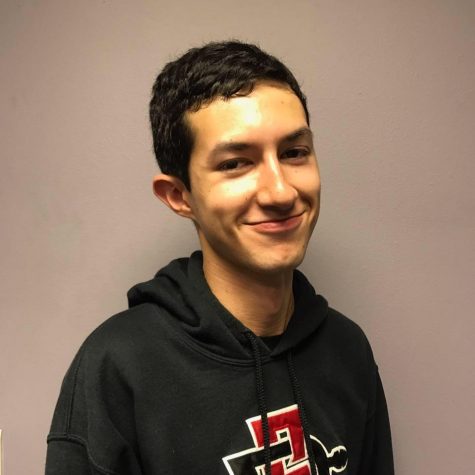A San Diego State student said she and two friends were stopped by university police officers and told their clothing made them susceptible to sexual assault the morning of April 13.
Business administration freshman Anita Wang said she and her friends were walking back to her dorm room in Chapultepec residence hall from a party at around 1 a.m. that Wednesday when they were approached by four SDSU police officers across the street from the university police station on 55th Street.
A pedestrian stop was recorded in front of the station at 12:45 a.m. on April 13 in a police media bulletin, though SDSUPD did not confirm it was the same incident Wang reported. The involved parties were “advised,” according to the bulletin, meaning officers spoke to the involved parties but no arrests were made.
Wang said one of the officers asked one of her friends how much she had to drink before asking all three students for identification.
At that point, she said one of the officers told them it was dangerous for them to be walking around at night, and then asked her how her father would feel if he saw her in the outfit she was wearing.
“That’s so uncalled for,” she said. “I don’t see how you can pretty much just sexualize my body when I’m doing nothing but the right thing.”
She said it was particularly insulting because of a sexual assault that occurred a few hours earlier, on Wednesday, April 12, in which a woman was touched inappropriately while sitting in her parked vehicle on Montezuma Road.
This sexual assault incident was later reported to students in an email two days later.
“She was literally just sitting in her car. She was not intoxicated. She was probably not wearing anything provocative,” she said. “She did everything right in their eyes and she was still in that uncomfortable situation. So if someone is going to assault you it’s not because you’re asking for it or anything — it’s because they’re an awful person.”
Twitter user @karly_nolan tweeted a screenshot of a text message regarding the incident the morning of April 13.
SDSUPD’s twitter account responded with two tweets within four hours of @karly_nolan’s tweet.
“We do not condone this behavior,” one of the tweets read. “Our goal is to provide superior services while maintaining respect and professionalism.”
The next tweet advised the Twitter user to contact the chief of police to discuss the incident.
“Somebody who was involved with the tweet responded that they would contact us,” SDSUPD Chief of Police Josh Mays said. “They have my phone number, so they know the best way to get a hold of me, but without having all of the information in front of me and talking to everyone there, it’s difficult to comment on a tweet.”
Wang also said the friend who posted the tweet was emailed by SDSU police, though she has not responded.
Sexual assault is a continuing problem at SDSU.
University police recorded 27 sexual assaults in 2015 and 11 in 2016, according to SDSUPD statistics.
Four were recorded in 2017 as of April 12, though the victim changed her mind about pressing charges in one case, SDSUPD Lt. Greg Noll said.
However, none of the assaults reported in 2016 took place during the spring semester.
Noll said it is unusual to receive zero reports of sexual assault during an academic semester, and it is difficult to find a reason why this was the case.
He attributed it to chance.
“I would just say it’s one of those cycles,” he said. “We were fortunate that we didn’t have anything for that one period of time.”
Dr. Huma Ahmed-Ghosh, an SDSU women’s studies professor and a former member of the university’s Sexual Violence Task Force, said it did not sound right to her that there were no sexual assaults during an entire semester.
“Just from the probability standards, it is not possible that none occurred,” she said. “My first reaction would be: Why are (students) not reporting it to the police?”
Of the 38 sexual assaults reported to campus police in 2015 and 2016, six were made by university employees or medical professionals who are required by law to inform law enforcement of sexual assaults.
Often, these mandatory reports include little or no identifying information.
Noll also said when it comes to sexual assault, sometimes “people get stuck in situations where things are allowed to go to a point where there’s miscommunication or misinterpretation of what they want.”
“And many times, the guy thinks it was OK for this to happen, and the girls after the fact are regretting what happened,” he said. “And as a result of that regret, they think back and think about things that they probably might have done or could have done earlier than allow it to get to a point where this type of crime occurs.”
Wang said given the April 13 incident and the way Noll addressed sexual assault, she is not confident in SDSUPD’s handling of such cases.
“I’m sure (Noll) was trying to say it in a nicer way and it was definitely less blunt and not directed to anyone in particular, but I guess the general mindset is kind of the same,” she said.
Ahmed-Ghosh called Noll’s statement problematic because it excuses men from the crimes they commit against women.
“Basically what the police officer is saying is that the girls still have to be more careful and it is the girl’s fault,” she said.
Ahmed-Ghosh said it sounded to her as though Noll implied sexual assault victims lead assailants on, and she questioned who the misinterpretation and miscommunication Noll mentioned is referring to.
She said the comments “reek of the kind of victim-blaming we have been seeing forever,” and suggested SDSU police need gender-sensitization training.
“They need levels of training about what is sexual violence, so that such obnoxious comments are not made in public,” she said.
Noll said the penal code is very specific when it comes to sexual assault, but the problem is both parties usually know each other, and the assault took place without any witnesses.
“It becomes one person’s word against another person’s word,” he said. “That’s a really difficult case to prove from an investigative standpoint when you don’t have any other additional witnesses or anything to corroborate statements of fact that both people are displaying differently.”
SDSU Title IX Coordinator Jessica Rentto said Noll’s statement is not the type of language she would use, but she has worked with SDSUPD extensively and has full faith in its ability to handle cases of sexual violence.
“It’s not the language that many of our police officers use,” she said. “We don’t want victim survivors to hear those type of snippets and think they’re not going to be supported if they report. And that’s a risk.”
SDSU Chief of Police Josh Mays later attempted to clarify SDSUPD’s stance on sexual violence.
“Sexual assault is a very serious and complex issue that we at the university police department take very seriously,” he said.
Mays said any time a report of a sexual assault occurs, SDSU police do not second guess any individual reporting the crime.
SDSUPD officers are required to attend a 40-hour sexual assault investigators course, and during this training, a large amount of time is spent on the best ways to support victims, he said.
Ahmed-Ghosh said if Noll received this training and still making statements like this, he needs to be removed from any duty related to sexual assault.
“I’m not saying he should lose his job,” she said. “But this is definitely not the area in which he should be employed or allowed to interact because it’s a dangerous zone that he creates.”









